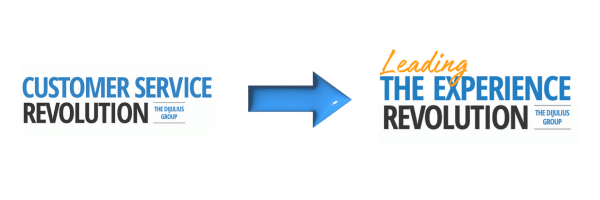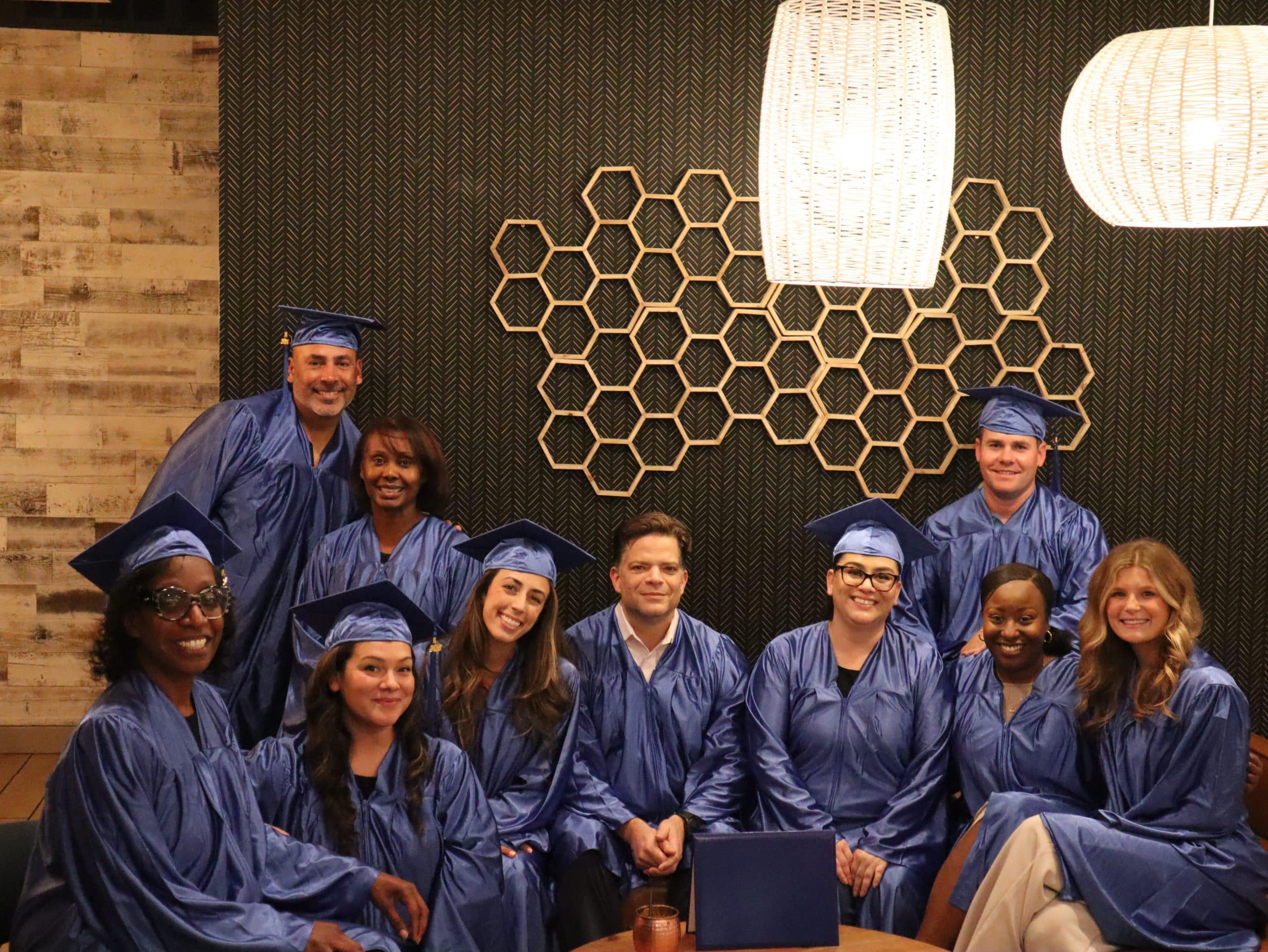How To Keep The Underdog Spirit Alive In Your Culture As Your Organization Grows
The Future of CX has never looked Brighter 
We would like to congratulate the graduating class of Customer eXperience Executive Academy (CXEA) 2024!
During this part-time, twelve month program, graduates were trained to design, lead, and manage the customer experience their companies deliver. Each completed a capstone project and attended intensive quarterly sessions where they reported progress, participated in hands-on workshops, and executed strategic plans. They are armed to help their organizations dominate their industries by having superior customer experience; becoming the brand customers can’t live without, making prices irrelevant.
From left to right, back row: Emiliano Escandon (Rize Credit Union), Tina Hall (Charlotte Area Transit System (CATS)), Adam Bosacki (Bauer Built)
Front row: Pamela White (CATS), Stephany Alarcon (Corsica Technologies), Erica Rhines (Open Technology Solutions), Neil Barrie (Rudis), Lupita Worthington (CBC Federal Credit Union/Ocean Air Credit Union), Nicki Galloway (CATS), Jenna Rouse (John Robert’s Spa)
To learn more about The Customer Experience Executive Academy and how your leaders can attend, contact Claudia@thedijuliusgroup by email or Click here to schedule a call today.
How To Keep The Underdog Spirit Alive In Your Culture As Your Organization Grows
As companies grow and mature, most lose their start-up mentality that made them so unique, the “us against the world” underdog mentality. Senior leadership can’t understand why years later, when they have the resources to pay their employees better and offer great benefits and more career opportunities, their new generation of employees are not nearly as committed, loyal, or hardworking as the first few generations.
Why? Because people want to be part of something bigger than themselves, something to fight for. That start-up mentality helped galvanize the first few generations of employees to rally together and fight the Goliaths to right what was wrong in the world. Typically, these earlier generations of employees gave up better-paying jobs at the time, worked longer hours, and made sacrifices to help the founders realize their vision.
Employees went from helping a start-up underdog, flying by the seat of their pants, trying to keep the doors open, to a successful corporation to now working for that same organization that now has systems, processes, policies, and layers and layers of bureaucracy and management. Back in the day, it was one team. Initial employees would work all weekend with
the founders, eating pizza on the floor and trying to figure out how they would make it. Years later, entry-level employees, maybe even mid-level leaders, don’t even know the founder/CEO or even have that relationship with their direct leader.
The key to scaling successfully is finding ways to maintain that underdog attitude at every stage of your company’s life, to keep every generation of employees fighting for your cause, which, when done correctly, becomes their cause. There is a reason why everyone roots for the heavy underdog team that the pundits give no chance to win.
“If you can persuade, inspire, and ignite the imagination of
others, you will be unstoppable, irresistible, and irreplaceable.”
—Carmine Gallo, author
Your team members must believe that the more successful the company is, the better off the world will be. An organization’s emotional commitment translates into making company success a personal crusade.
Villain, Victim, Hero
A great way to rally a team around a unified vision is through constantly incorporating the villain, victim, and hero characters into your storytelling. Every great fairy tale, story, book, and movie always possesses three components: a villain, a victim, and a hero.
The villain is the antagonist that needs to be stopped and conquered for the overall good. The villain can be the norm of your industry, dominant companies, the current circumstances, or having no better alternatives. Having an identifiable enemy gives us the chance not only to articulate and showcase our faith but also to unite ourselves with our fellow believers . . . this us-versus-them strategy attracts people with a common purpose.
The victims are typically innocent and helpless. They are forced into a situation undeservingly and at no fault. They could be the business employees, customers, family members, or the community.
The hero is the answer to all the problems and the best solution to stopping the villain. The hero is not one person but a team rallying together to be a positive force of good and change. The hero offers a better way of doing something, breaks from the status quo, and inspires people to embrace and accomplish the impossible.
More Is Caught Than Is Taught
Every internal meeting should always open and/or close with your company’s why, which comes from your mission, purpose, values, and customer experience action statement. You can never tell your team members too often what your brand stands for, how this makes your company different and superior, and each team member’s integral role in making that a reality.
However, just talking about your values is not enough. Leaders need to model these behaviors 100 percent of the time. Walk the talk, be the example, and constantly share examples of employees modeling your values. Great leaders inspire others by the way they live. Your actions demonstrate your true priorities more than any words you use. The
loudest message you can speak is the way you live your life.
“Go show the proper way, and when necessary, use words.”
Who Wants to Be a Billionaire?
From the moment we heard what the new definition of being a billionaire is, we absolutely loved it. It ties in perfectly with creating an Employee Experience Revolution. In his TED Talk, corporate futurist Pete Dulcamara redefined the meaning of billionaire as “someone who positively affects the lives of a billion people.”
Each of us absolutely has the ability to be a billionaire. Most of us probably don’t come in contact with a billion people in our lifetimes. However, through the hundreds of thousands of people we do encounter—family, friends, employees, coworkers, clients, and strangers—we can practice being kind, genuine, and present. The ripple effect from those positive interactions can
positively impact a billion people.
“It’s time we create businesses with purpose, businesses that drive humanity-centric innovation. It’s time that we stop working for business and business starts to work for us,” says Dulcamara.

The 2024 Customer Service Revolution
has become Leading The Experience Revolution
- Two 3-hour Workshops designed to improve your customer and employee journeys
View John DiJulius and Dave Murray as they explain more, and what you’ll learn: 👇👇
Register your team today!
October 28th: Customer Journeys
November 4th: Employee Journeys
Register Now to Create Signature Experience Journey Maps That Retain Your Customers and Employees
 During these livestream workshops, The DiJulius Group will guide you in creating a distinct brand experience that will keep your customers and employees engaged.
During these livestream workshops, The DiJulius Group will guide you in creating a distinct brand experience that will keep your customers and employees engaged.
What’s Included:
-
Registration for two workshops, up to 5 team members at one price, $249
-
Full access to both workshops. You will work on building your Customer experience journey map during the Oct. 28th event and your Employee experience journey map on Nov. 4th.
-
Digital workbooks for each workshop with download for each registrant
-
Replay of both workshops, post event, with 4 weeks access to each
-
Support post-event; you will have access to a live one hour zoom Q&A one week post event to ensure you are implementing properly
Two Day Event
Oct. 28: Customer Experience Journey Mapping 12:00-3:00 PM ET
Nov. 4: Employee Experience Journey Mapping 12:00-3:00 PM ET
Register up to 5 team members for the introductory price of $779 $249
Bring John DiJulius in to your team or event!
Take advantage of special savings when John is in your area.

Upcoming FREE Webinars with The DiJulius Group:
Free Registration click here. 
24 October: Creating Your Customer Experience Action Statement
14 November: Forget Customer Surveys; Learn Real CX KPI’s
6 December: Service Recover Never and Always



